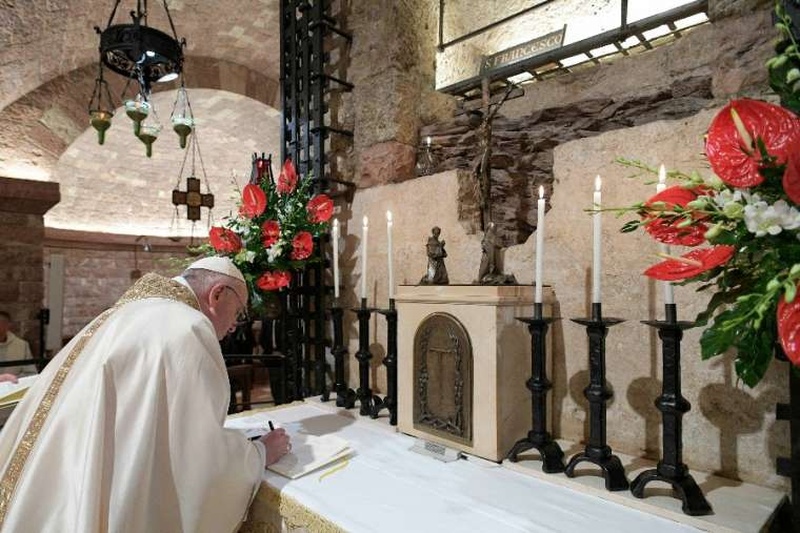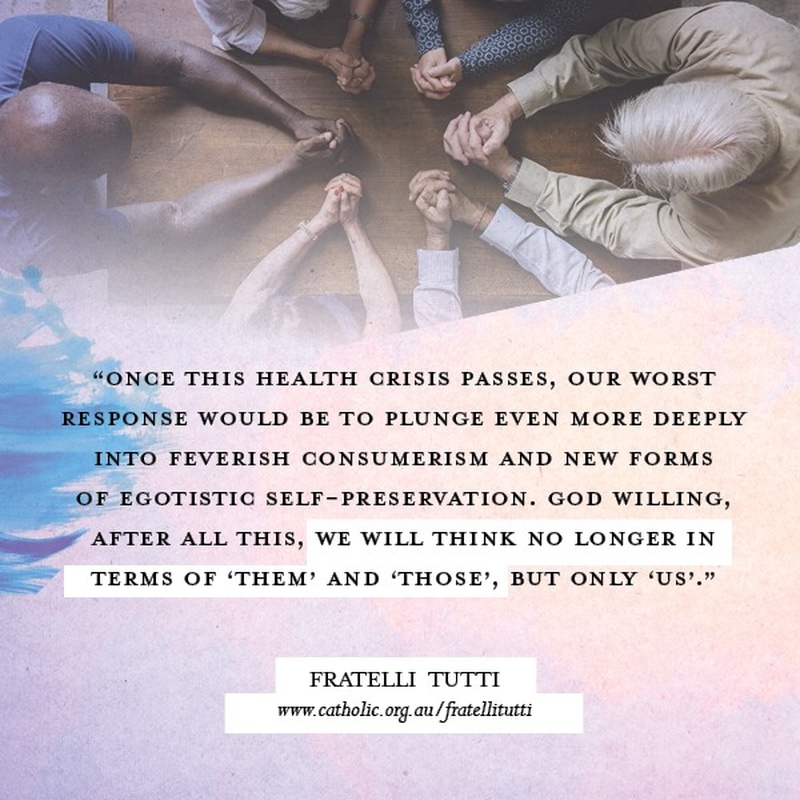Fratelli Tutti
Pope Francis published his third encyclical on 4 October after signing it the day before on the tomb of St Francis of Assisi, his namesake and one of the sources of his inspiration for this letter. An encyclical is a "circular letter" to be spread throughout a community. The word comes from the Greek egkyklios, with kyklos meaning a circle.

A papal encyclical is one of the highest forms of communication by the pope and usually deals with some aspect of Catholic teaching — clarifying, amplifying, condemning or promoting one or a number of issues. Fratelli Tutti (Brothers All) is an eight-chapter, 45000 word document that Francis was in the process of writing when the Covid-19 pandemic “unexpectedly erupted”. He argues that the current global situation and response to the pandemic shows the “fragmentation” of the world and the “inability” of countries to work together.
Francis devotes Chapter One titled Dark Clouds Over a Closed World to addressing the socio-political issues in our world including “limitless consumerism”, nationalism, globalism, “globalised indifference”, racism, economic privilege, immigration, social media, war, the death penalty, religious liberty, and religious violence. Francis paints a bleak picture but also calls on the whole world to join him in contributing to the “rebirth of a universal aspiration to fraternity”. He writes “Let us dream, then, as a single human family, as fellow travellers sharing the same flesh, as children of the same earth which is our common home, each of us bringing the richness of his or her beliefs and convictions, each of us with his or her own voice, brothers and sisters all”. In this sense Francis builds upon the message of his previous encyclical Laudato Si’ (Praise Be to You), in which he spoke of care for our common home. In this encyclical he speaks of care for each other, the family that dwells together in the common home.
Francis emphasises the need for true interfaith and cultural dialogue, authentic reconciliation and authentic encounters in order to achieve peace which he argues is a “never-ending task” built on truth, justice and mercy. He condemns the death penalty and draws attention to human trafficking and people living with disabilities who he writes can feel like “hidden exiles” in society. Francis also writes against the use of violence and goes the closest any pope has to changing church doctrine relating to the Just War Theory. He writes “We can no longer think of war as a solution, because its risks will probably always be greater than its supposed benefits. In view of this, it is very difficult nowadays to invoke the rational criteria elaborated in earlier centuries to speak of the possibility of a ‘just war’. Never again war!”. The Parable of the Good Samaritan, which is at the heart of our charism here at St Patrick’s, is analysed by Francis in Chapter Two of the encyclical titled A Stranger on the Road. In his exegesis he stresses that all are called to become neighbours to others like the Good Samaritan, to give time as well as resources, and overcome prejudices, personal interests, historic and cultural barriers.
While Francis has been praised by Catholic activists for his move away from the Just War Theory, he has drawn criticism for his use of gendered and exclusive language in the title and subtitle of this latest letter. A papal encyclical historically is addressed to bishops and priests of a country or region or to all clergy. Or encyclicals can be addressed to all Catholic faithful. Francis has stated that his encyclicals are not just for believers but for the whole human family. Catholic women around the world, however, have been insulted and disappointed due to the exclusive language used and have raised concerns about the potential harm for women in many cultures and nations as a result of this letter. One such critic, Phyllis Zagano, an internationally acclaimed Catholic scholar and lecturer on contemporary spirituality, made valid points within her article published in the National Catholic Reporter. She explains that the title Fratelli Tutti which translates to Brother’s All eliminates women. The fact that this title comes from the writings of St Francis does not change the exclusive nature of the language which is masculine or for men. The Vatican has argued that the subtitle is inclusive as it is dedicated to “fraternity” and “social friendship”. Zagano points out that again this word which means “brotherhood” is masculine and excludes women. She argues further that if these masculine words are truly inclusive then the use of “men” and “male” in Canon Law should also then be inclusive and refer to women. The example she uses to illustrate her point further and the importance of language is Canon 1024 that reads “A baptised male alone receives sacred ordination validly”. Here it becomes clear that the church and the pope need to seek the involvement of female members of the faith when creating and reviewing church documents. Our Congregational Leader Sister Patty Fawkner recently expressed her views about the language used in the encyclical despite acknowledging Pope Francis as someone she "admires" and whose leadership she "genuinely appreciates". She shares the perspective of Zagano and does not accept the "excuses that minimise the impact of exclusive language and the reassurances that the intention is to include all. Yet again, good intentions are not good enough".
Louise East - Religious Studies Coordinator
